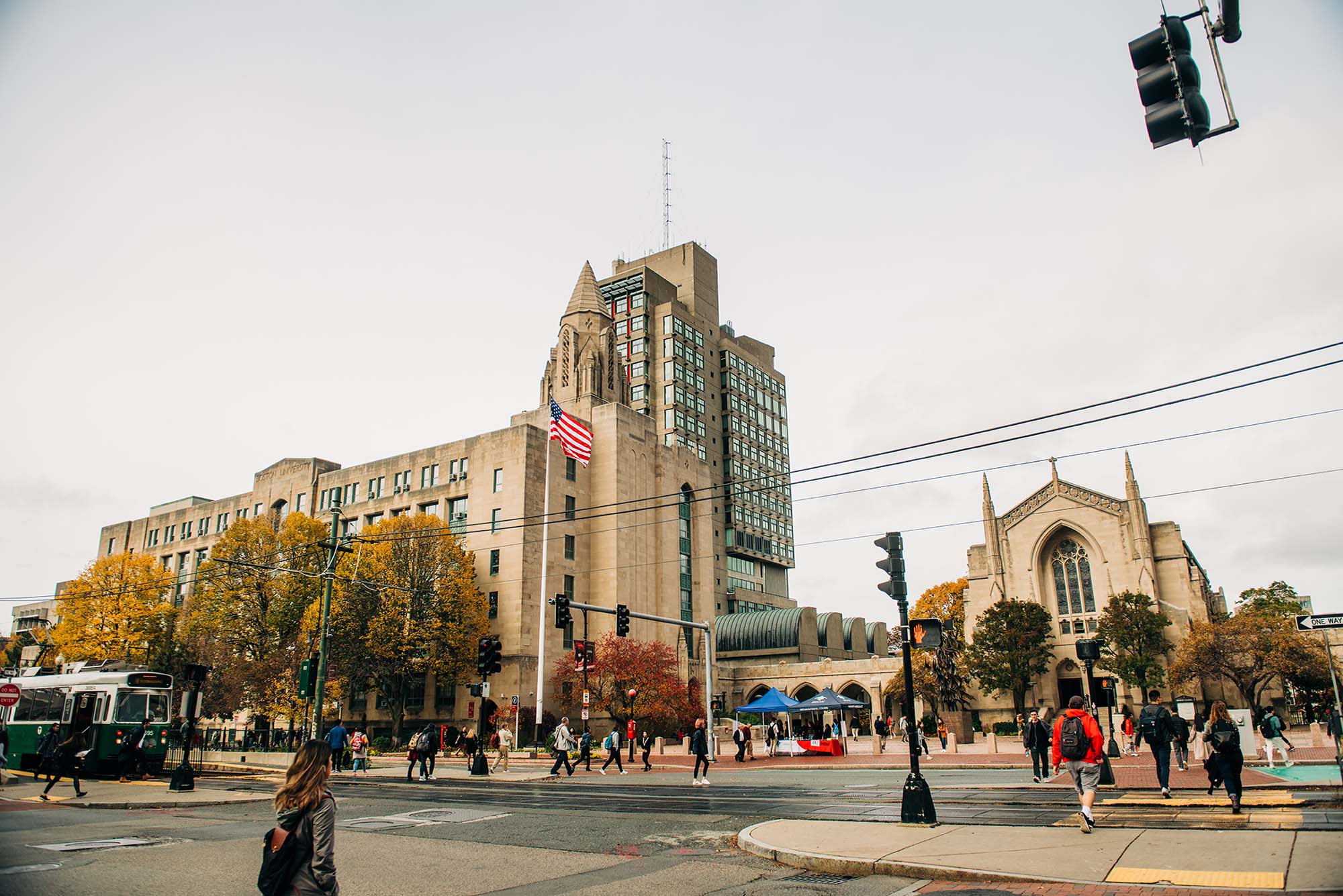BU Distributing Federal American Rescue Plan Money to Students

BU is distributing $21 million in federal aid to students who were financially hurt by the COVID-19 pandemic. Photo by Janice Checchio
BU Distributing Federal American Rescue Plan Money to Students
$21 million to go to those with need resulting from COVID-19 pandemic
The University has begun distributing almost $21 million in federal aid to students financially hurt by the COVID-19 pandemic. Certain students who haven’t completed a federal financial aid form and who think they may be eligible (see eligibility answers below) have until December 15 to apply.
The distribution began last week to students with exceptional need, identified by the University based on the information provided on their 2021/2022 Free Application for Federal Student Aid (FAFSA). Exceptional need is defined as an expected family contribution to education costs of $15,000 or less.
The federal money comes from the Higher Education Emergency Relief Fund (HEERF), included in the American Rescue Plan enacted by Congress and President Joe Biden last March. BU received $42 million, with the law allowing half for students and half for institutional costs. Last year, the University distributed two other rounds of emergency coronavirus aid to students under the 2020 CARES (Coronavirus Aid, Relief, and Economic Security) Act.
“I am thrilled to be able to distribute funds to our students who really need them,” says Julie Wickstrom, executive director of financial assistance and student employment. “I know that the pandemic has really disrupted people’s lives, and it’s great that we have these funds to help students and their families.”
She explained how the distribution works to BU Today.
Q&A
Julie Wickstrom
BU Today: How does BU determine eligibility for the HEERF funding?
Julie Wickstrom: The law stipulates that schools must prioritize the HEERF funds to students with exceptional need who have experienced additional costs related to the coronavirus.
BU Today: Are undocumented students and international students eligible for HEERF?
Julie Wickstrom: Yes, the Department of Education’s [DoE] final rule on student eligibility states that all students are eligible for emergency financial aid grants from the HEERF, regardless of whether they completed a Free Application for Federal Student Aid [FAFSA] or are eligible for Title IV. That includes citizens, permanent residents, refugees, asylum seekers, Deferred Action for Childhood Arrival recipients, other Dreamers [under the proposed federal Development, Relief, and Education for Alien Minors Act], and similar undocumented students. International students may also receive HEERF.
However, institutions must ensure that funds go to students who have exceptional need. The DoE encourages institutions to prioritize domestic students, especially undergraduates, in allocating this funding. This includes citizens, permanent residents, refugees, DACA recipients, other Dreamers, and similar undocumented students.
To meet these guidelines, individuals must be matriculated students who are registered for fall 2021, enrolled in a degree program, and have exceptional financial need.
BU Today: Can students who were enrolled in traditional distance education programs receive these funds?
Julie Wickstrom: Yes, distance education students who meet the other qualifications will be considered.
BU Today: How can students who have not completed the FAFSA request these funds?
Julie Wickstrom: Those students—including citizens, permanent residents, refugees, DACA recipients, other Dreamers, and similar undocumented students—can apply for these funds using the BU HEERF application process if they have experienced a financial hardship related to COVID-19. The University has created a centralized process that will enable students to apply for the funds. Undergraduate, graduate, and professional students can use the same online form to apply.
Students can only receive one grant and should not apply if they have already been notified they will receive funds.
BU Today: How much money will individual students receive?
Julie Wickstrom: Grants range from $500 to $2,800, depending on demonstrated need and availability of funding.
BU Today: How will a student be notified about their eligibility?
Julie Wickstrom: Students will receive an email from finaid@e.bu.edu to their BU email address, with Julie Wickstrom, executive director of financial assistance, confirming eligibility, and with instructions about how to claim their funds.
BU Today: How will a student get this money?
Julie Wickstrom: Students will receive a co-branded email from Chase Bank and BU with instructions about how to get the funds transferred electronically to their bank account. Students will be asked to provide their bank account information so that funds can be transferred directly into their bank account from Chase Bank.
BU Today: Will receipt of a HEERF Grant reduce other financial aid given to students?
Julie Wickstrom: No. HEERF Grants are special one-time federal grants. They are separate from other financial aid and do not affect them in any way.
BU Today: What should students know about utilizing the funds?
Julie Wickstrom: The intent of the program is to get needed funding into the hands of students without unnecessary burdens, requirements, or delays. Funds may be used by students for any component of their cost of attendance, or for emergency costs that arise due to coronavirus, such as tuition, food, housing, healthcare (including mental healthcare) or child care.
BU Today: Will students need to submit receipts or otherwise document that they spent these funds?
Julie Wickstrom: No. Documentation is not required.
Comments & Discussion
Boston University moderates comments to facilitate an informed, substantive, civil conversation. Abusive, profane, self-promotional, misleading, incoherent or off-topic comments will be rejected. Moderators are staffed during regular business hours (EST) and can only accept comments written in English. Statistics or facts must include a citation or a link to the citation.